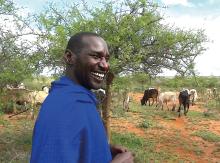Land Library Search
Through our robust search engine, you can search for any item of the over 73,000 highly curated resources in the Land Library.
If you would like to find an overview of what is possible, feel free to peruse the Search Guide.
/ library resources
Showing items 1 through 9 of 11.The paper seeks to establish the role of religion and culture in the realization of women’s rights to property in Nigeria. It begins by affirming that protecting women’s rights to property in Nigeria is a fundamental step towards achieving the 5th Sustainable Development Goal of gender equality.
It is widely accepted among economists and policy-makers that secure and well-defined land property rights are integral to poverty alleviation and economic prosperity. But how do legal systems, land tenure and economic development really relate to one another?
The year 2016 marks 15 years since the new wave land reforms became operational in Tanzania. Despite its ambitious goals – encouraging land registration and titling, and empowering women and other vulnerable groups – the results are disillusioning.
The land reform process in Cambodia is full of examples of injustice and human rights violations. Promises to improve the situation of the landless and land-poor citizens have remained unfulfilled. Development co-operation efforts have not changed this either.
Does the inclusion of land rights in the global development agenda bear the potential to promote the secure and fair distribution of land rights? Yes, our author believes – provided that the land-rights community does not rest on its laurels and really addresses the crucial aspects.
On the 11th May 2012, the Committee on World Food Security of the United Nations adopted the Voluntary Guidelines on the Responsible Governance of Tenure of Land, Fisheries and Forests (VGGT).
Publicly elected women representatives in India ought to take advantage of their influence to defend women’s rights.
Pour de nombreux pays, la mise en place d’une politique rationnelle de gestion des forêts est une tâche difficile.
In many Asian, African, and South American nations, indigenous people are being driven from their homes: Government authorities are leasing hundreds of thousands of hectares of land belonging to indigenous people who only in the rarest of cases possess deeds to the land that are recognised by the








